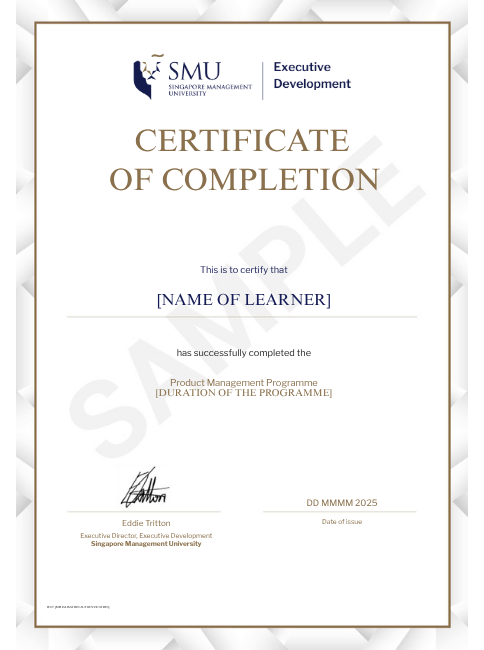Programme Partner

Overview
Why Enrol in Product Management?
The success of a company increasingly hinges on the effectiveness of its product management process—now more than ever, with AI redefining how products are conceived, built, and scaled. Whether you're launching new offerings or enhancing existing ones, managing the product life cycle requires both strategic leadership and data-driven agility. In fact, nearly 70% of product managers agree that product management is fundamentally a leadership role.
The Product Management Programme - Integrated with AI from Singapore Management University equips you to lead this evolution—offering the skills to manage the entire product life cycle, while also integrating AI-powered tools and frameworks that are shaping the future of product success.
- Next Course Starts On 31 Mar 2026 (Tue)
- Duration14 weeks, Online 4-6 hours per week
- VenueOnline

Learning Objectives
• Develop the product mindset needed to bring viable products (or services) to market
• Define the problem a product will solve, map the customer’s journey and create user personas
• Use design thinking to generate innovative ideas and solutions to design problems
• Analyse strategies and frameworks for developing, marketing and selling a product
• Evaluate product road mapping and prototyping decisions using various product management techniques and practices
• Outline a plan to create a competitive scalable product using key product development strategies and frameworks
• Develop an understanding of the different types of pricing strategies and formats in launching a new product, and how an innovative pricing strategy can be a critical differentiator in launching a new product
PROGRAMME HIGHLIGHTS
Pre-recorded Video Lectures
Self-paced learning from SMU faculty, with select live sessions.
25+ Assignments
Hands-on tasks to apply product strategies and frameworks.
Tool Demo Sessions for 5+ Tools
Exposure to key tools used across the product life cycle.
2+ Case Studies
Deep dives into successful product strategies and decisions.
Generative AI Modules
Learn how GenAI is transforming modern product development and decision-making.
Industry Examples
Real-world product management scenarios and use cases.
10 Peer Discussion Boards
Engage with peers on product challenges and insights.
Live Sessions by SMU Faculty
Interactive live online sessions with SMU faculty.
Capstone Project
Apply your product management learnings in the form of a capstone project.
Live Online Masterclasses
Masterclasses on AI and gen AI by industry experts.
Topics/Structure

Features:
- Definition of Product Management
- Gartner View On Product Management
- General Product Management Skills
- Specific Product Management Skills in Software, Technology, Life sciences
- Role of a Product Manager
- Case Study Discussion: Kindle Fire
Features:
- Product development in the digital age
- Designing customer centric products and design thinking
- Product opportunity gap and minimum viable product
- Lean and agile product development methods
- Pricing strategies & business models
Live Session:
- AI in Product Discovery and Prioritization
Features:
- Managing product life cycle
- Product Portfolio Strategy
- Portfolio Management
- Cumulative Demand Growth Life Cycle
- Value Creation
Features:
- Empathising with ethnography
- Introduction to design thinking
- Prototyping and testing
- Ideating by numbers
- The value proposition.
Live Session:
- AI for Ideation, Personas and Hyper-Personalization
Features:
- How to prepare a PIC
- Preparing a product concept
- The problem-find-solve approach
Live Session:
- Agentic AI for Product Roadmapping and Strategic Execution
Features:
- Introduction & warm-up interactive individual exercise with Miro
- What’s UX? (Roles, Day in Life of UXers, Current Trends in the field)
- On-boarding Figma
- Figma follow-along activity
Live Session:
- UI/UX Design for Product Managers
Features:
- Traditional and Lean product development processes
- Agile scrum philosophy and methodology
- Agile and Design Thinking
- Combining best practices
Tools Workshop:
- Live online tool workshop from faculty
Features:
- Strategic importance of pricing
- Value-based pricing
- Multidimensional value
- Creating value-based pricing
- Business pricing models:
- Product as a Service (PaaS)
- Freemium Pricing Model
- Users as Product Model
- Subscription and Value Chain Delinking Model
- Walled Garden Mode
Live Session:
- AI for Dynamic Pricing and Financial Modeling
Features:
- Introduction to Positioning: Direct Competitive Comparison, Category Shifting, Uniqueness
- Preparing for Positioning
- Firm Considerations
- Reflecting Strategies with examples
Salient Features:
- Introduction to Product Life Cycle (PLC):
- Profit Considerations of PLC
- PLC Models
- Growth, maturity and decline considerations.
- Importance of Pricing from a consumer and financial perspective.
- Different prototypes of pricing strategies and a discussion of their advantages and limitations.
Live Session:
- Agentic AI for Product Operations and Workflow Automation.
Features:
- Growth Hacking Strategy
- Strategy as Position: 5 Forces analysis
- Concept of causal reasoning
- Effectuation
- Principles of effectuation
Live Session:
- Growth Hacking - Live Session with Professor David Gomulya
2 Hours per session
- Session 1: Asana AI and Notion AI
- Session 2: SQL (SQLAI) and Mixpanel
- Introduction to Generative AI
- Generative AI Models
- Working with Generative AI
- Gen AI for Product Management
Live Session:
- Gen AI in Product Management
The bonus content on Generative AI is optional and does not count towards your final evaluation.
Who Should Attend
The programme is designed for both tech and non-tech professionals. Representative roles and industries that can benefit include:
Industries: IT Product & Services, Banking and Financial Services, Pharmaceuticals, Consulting and beyond
Functions: Technological Management, General Management, Operations, and Consulting
This programme is ideal for professionals who are looking to develop new products/services, to increase revenues and profitability, conceptualise disruptive business models with a product-centric approach, manage product portfolios and corporate strategy,

Assessment

Schedule
Start Date(s) : Tue, 03/31/2026 - 12:00
Intake Information :
Refer to Online Singapore Management University Courses - Emeritus - Online Certificate Courses | Diploma Programs for the latest updates on application dates and discounts.
For more enquiries, please email to ur-opsteam-APAC@emeritus.org or ruswelt.pereira@emeritus.org.
Alternatively, you may also write to us at exd@smu.edu.sg for any urgent matters related to the programme.
Note:
- This programme is primarily self-paced online with some live sessions conducted by programme faculty. The availability of post-session video recordings is at the discretion of the faculty members, and Emeritus or the institute cannot guarantee their availability. We have a curated panel of distinguished industry practitioners who will conduct weekly live doubt-clearing sessions.
- Assignments will be graded by industry practitioners who are available to support participants in their learning journey, and/or by the Emeritus grading team. The final number of quizzes, assignments, and discussions will be confirmed closer to the start of the programme.
COURSE FEE
US$ 2,100 +Applicable Taxes
*Singapore residents who wish to enrol for this programme will be charged GST.
*Applicable taxes will be charged at checkout.

